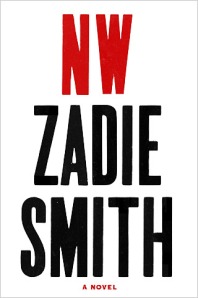Archive for December 2012
NW, by Zadie Smith
I’ve been putting off writing about this book because it’s everywhere right now, and I was inundated with reviews before I even picked it up. I don’t think this is always a bad way to begin a book–in fact, I was lucky enough to attend a reading by Zadie Smith a few days before I started in it which she said a lot of things that focused my attention and inquiry as I read, giving me things to think about that I’m not sure would have occurred to me on my own. But sometimes when I don’t have a very particular point to make about a book that’s already the focus of so much hype, contribution to the conversation feels less enticing, certainly less urgent, ya know?
Let me begin by saying that I think Smith is kind of genius, and if you ever get the chance to hear her speak, you should take it. She has a knack for distinctive voices and for recognizing the everyday details of city life which, under her pen, shed their mundanity to reveal telling characteristics about urban modernity at large. I adored White Teeth, which was critically recognized for its representation of London’s multiculturalism, and I also liked On Beauty, her lesser-well received third novel (I skipped The Authograph Man and have yet to get to her essay collection Changing My Mind). So, I was thrilled to learn of this novel’s release a few months ago.
NW is the postal code for the low-income neighborhood in which the book’s few characters grew up. The first of the sections focuses on Leah, who lives in that neighborhood still and has a nice husband and a steady though not very lucrative job but can not reconcile herself to the fact that her life seems to be creeping along, progressing predictably. Her husband wants children and though she also seems to think of children as the logical–or biological–next step along a preset path, she is loath to surrender herself to it, to aging. She struggles against change, clinging to stability, to the past.
This is why she seems to resent her lifelong best friend Natalie, whom she knew in childhood as Keisha. Socially disadvantaged by her race, Keisha works much harder than her white friend Leah and far surpasses her in class. She becomes a successful lawyer with two children and a lovely house in a nicer neighborhood. Whereas Leah fears the passing of time, Natalie does her best to accelerate it, to distance herself from the past that she shared with Leah and other youthful acquaintances, to become someone important. But Natalie is far from the happy, confident person that Leah sees when she looks at her. She is empty, a projection of a person she worked hard to create but does not particularly like, know, or identify with at all. She acts out secretly, eventually reuniting with sketchy, down-and-out Nathan, Leah’s first crush and their early playmate.
To my mind, the most sympathetic character is Felix, whose story provides the novel’s action and is in that way, without their knowledge, at the center of the others’ orbit. He’s a funny, easygoing young black man, less career-driven than Keisha, more dynamic and less privileged than Leah. The mostly apolitical son of radical parents and a recovering druggie, he takes things as they come and is constantly moving, working to make ends meet for his kids. His narrative is complex and alive: I wish he could have commanded more of the novel’s focus.
The book is about all of the uncomfortable ways in which race, class, and other tensions are broached every day in a contemporary urban setting and, as Ana writes about so perfectly, begs questions about free will, ambition, and identity in this context. It’s an interesting theme, and the book’s characters, particularly Natalie, who believes that people get what they work for and therefore deserve their what they get, are set up perfectly to explore the truth or deception of this belief system. Like Ana, I am adverse to this idea, but agree with her that
if we want to fight these ideas it’s important to understand their psychological appeal, especially for people who were not born into privilege or whose lives are still so precarious – people we’d perhaps expect would be deeply aware of how far from a meritocracy the world really is.
Zadie Smith’s portrayal of Natalie in NW allowed me such understanding.
Still, I felt a little bored by both Natalie and Leah and their discontent. Not that it’s somehow invalid for either character to feel the way they do, but both characters seemed a little too perfectly constructed as emblematic of ideas, of representative of a modern malaise that is already a familiar trope. The everyday scenes that made up their narratives may have elicited knowing smirks from this city-dweller and, I’m sure, from many others so suited…but the weight of Smith’s philosophical query hinged on very little plot. Normally, plot doesn’t concern me much if what I’m reading is exquisitely written, and I do think Smith is, generally, an exquisite writer. But the “big picture moment” comes late in the game on this one (at least, it did for me), and for too long I felt “I get it…so?”.
NW does offer a lot to think about in terms of class mobility, social inequality, and self-determination, and Smith maintains her acclaimed stylistic edge. It may not be White Teeth, but it is still a good, smart read, and I would recommend it for those who have enjoyed Smith in the past and haven’t cracked it yet…I might just wait for all the talk of it to die down first, and unrealistic expectations with it, which mine possibly were.
